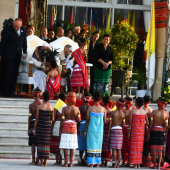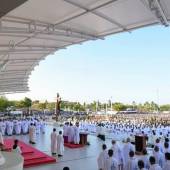Timor Leste Archbishop urges country's president-elect to uphold Constitution

The Democratic Republic of Timor Leste held the second round of presidential elections on April 19.
The independence leader and Nobel laureate Jose Ramos-Horta has been re-elected president of Timor-Leste for a second term.
He was the country's president from 2007 to 2012.
The country's presidential elections were held in two phases since no candidate received a majority of votes in the first round of voting last March 19.
According to state election officials, Ramos Horta earned the most votes in the second round, 62.09 percent. He will be sworn in on May 20, the 20th anniversary of this Asia's youngest nation.
Francisco Guterres, the country's current president got 37.91 percent of the votes.
Archbishop Dom Virgilio do Carmo da Silva of Dili expressed optimism that the president-elect will uphold the country's Constitution.
"I hope that whoever is elected president returns to the state Constitution since it serves as a check on the country's capacity to operate properly," said Archbishop da Silva.
“We must maintain the constitution and instill discipline in all residents to permanently convert our nation into a peaceful, prosperous, and democratic society," said da Silva after casting his vote in Dili.
As he sees it, whoever is elected must act as a father figure for the country's people and be respected by all political groups.
“As the head of the country,” he said, “There should be no differentiation in service based on supporters, but rather that everyone must see the same thing because most of the country's people have already chosen their president, who must act as universal leader.”
On top of that, the Salesian Archbishop congratulated the people of Timor Leste for their participation in the elections, both in the first and the second round.
According to the analyst, the new president will have a hard time getting the country out of poverty.
“The expectation for the new president is that he would promote peace and stability than instability, chaos, and economic crises,” Acacio Pinto, a social scientist, and Catholic leader told RAV News.
The road to democracy has been challenging, as governments have struggled to combat widespread poverty, unemployment, and corruption. Its economy is based on the dwindling profits from offshore oil.
As many as 42% of the people living in East Timor live below the poverty line, according to the World Bank's report. This is a result of the outbreak of the Covid-19 pandemic.
Since achieving independence from Indonesia, this Southeast Asian nation of 15,410 square kilometers and 1,167,242 residents has grown to be Asia's second-most Catholic country (after the Philippines), with around 98.3 percent of the population being Catholic.
Dili, Maliana, and Baucau are the three dioceses in the country.
Radio Veritas Asia (RVA), a media platform of the Catholic Church, aims to share Christ. RVA started in 1969 as a continental Catholic radio station to serve Asian countries in their respective local language, thus earning the tag “the Voice of Asian Christianity.” Responding to the emerging context, RVA embraced media platforms to connect with the global Asian audience via its 21 language websites and various social media platforms.
Comments
thank you po.

















- Reply
Permalink